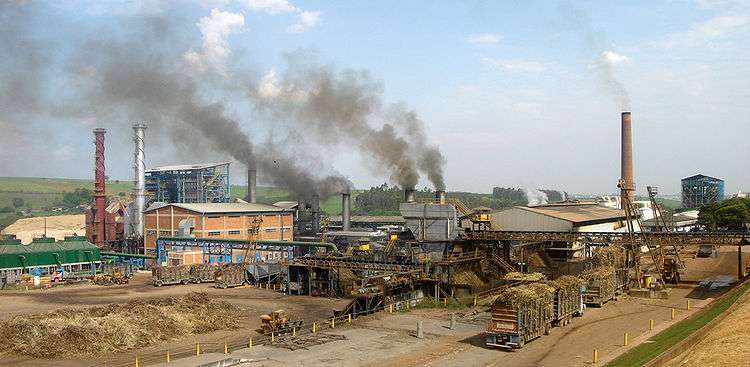Raízen
Raízen (Brazilian Portuguese: [ˈʁɑ i:z eɪn], pronounced Ha-ease-ain't) is the third largest Brazilian energy company by revenue and the fifth largest in Brazil. The company is a joint-venture formed in 2010 from the merger of the assets of sugar, fuel and ethanol derived from sugar from Cosan and Royal Dutch Shell in Brazil. The company has a market value of approximately US$ 20 Billion and a revenue of about US$ 28 billion.[1]

 | |
| Private | |
| ISIN | USL7909CAA55 |
| Industry | Energy |
| Founded | 2010 |
| Headquarters | São Paulo, Brazil |
Key people | Luis Henrique Guimarães, (CEO) Rubens Ometto Silveira Mello, (Chairman) |
| Products | Ethanol Sugar Electric energy |
| Revenue | |
Number of employees | 35,000 |
| Parent | Cosan Royal Dutch Shell |
| Website | www.raizen.com |
Raízen has a network of 7,000+ fuel stations under the Shell brand spread throughout Brazil and Argentina, more than 1,000 convenience stores and an ethanol production of over 2.2 billion US gallons (8,300,000 m3). The company also has 26 ESB (ethanol, sugar, and bioenergy) plants, with a total crushing capacity of 62 million tonnes of sugar cane per year, while also boasting 940 megawatts of installed electric power capacity produced from sugarcane biomass (bagasse). Many of these plants were inherited from Cosan at the creation of the joint-venture, while several others were acquired from competitors as part of an expansion strategy. In the fuel trade business, Raízen trades approximately 31 billion liters per year in both B2B (mainly the transportation and industrial sectors) and B2C segments (through its network of 7,000+ fuel stations across Brazil and Argentina). It aimed to certify just under 1 million hectares of affiliated sugarcane production area under the Bonsucro sustainability standard by 2020.[2]
References
- http://www.ecoseed.org/business-article-list/article/1-business/10106-shell-cosan-launch-$12-billion-brazil-ethanol-venture-ra%C3%ADzen
- "Biodiversity Implications of a Sustainability Standard for Sugarcane: Report of the IUCN-convened expert group assessing biodiversity implications of Raízen's implementation of the Bonsucro Standard in Brazil" (PDF). Retrieved 2014-08-29.